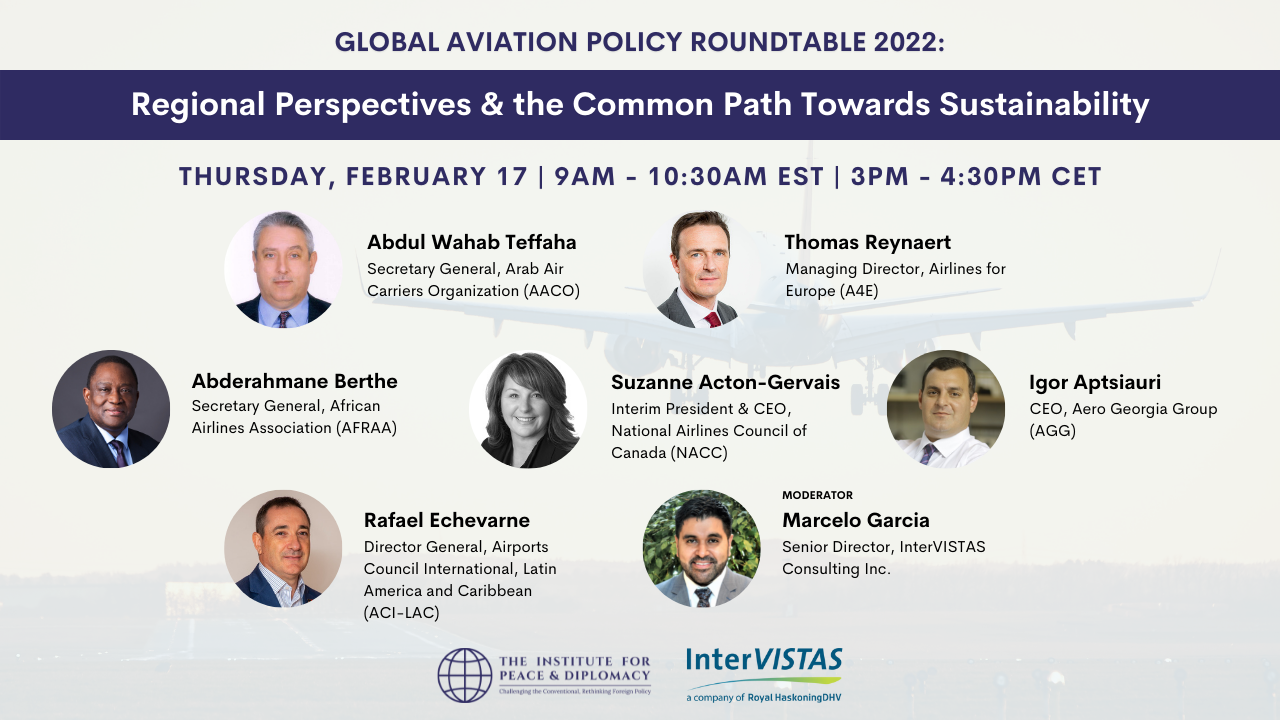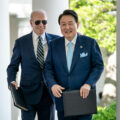
The Institute for Peace & Diplomacy will host a joint webinar titled ‘Global Aviation Policy Roundtable 2022: Regional Perspectives and the Common Path Towards Sustainability‘ in collaboration with InterVISTAS on February 17, 2022.
Global aviation has been historically vulnerable to external shocks such as economic crises, geopolitical tensions, oil prices, militant terrorism, and public health outbreaks. The COVID-19 pandemic has not only accelerated some of the social trends and technological developments observed in pre-pandemic years, but it has also reenergized the global aviation industry in unexpected ways, creating opportunities for collaboration, innovation and future visioning.
This roundtable brings together influential regional voices from around the world to discuss the challenges ahead on how to advance a common path towards sustainability. In addition to regional updates from each of the speakers, some of the questions that will be discussed will include: how can regional experiences and current initiatives inform the way forward? How can we close the economic and infrastructure gaps that exist across regions? What are the key obstacles to achieve the common path towards sustainability? How can we ensure that global aviation does not become a tool of coercive diplomacy?
Panelists:
Abdul Wahab Teffaha
Secretary General, Arab Air Carriers Organization (AACO)
Mr. Teffaha joined AACO in 1980 as an assistant tariff analyst and rose in the ranks until becoming Assistant Secretary General in 1992. He was elected Secretary General of the Association in June 1996 and still serves in this capacity. Mr. Teffaha has played a key role in developing and deploying a new strategy for AACO based on delivering specific, measurable, attainable, relevant and time-bound results to AACO member airlines. Joint projects between AACO members have included initiatives on distribution agreements, ground handling, fuel, training, and MRO cooperation. Mr. Teffaha also leads AACO on all industry affairs related issues and has been consistently a leading voice and advocate on aeropolitical and regulatory issues that affect AACO members within the region and foreign markets.
Abderahmane Berthe
Secretary General, African Airlines Association (AFRAA)
Mr. Berthe has over 30 years of experience in the air transport sector, including 16 years acting as Managing Director for various African airlines including Air Mali and Air Burkina. As Secretary General of AFRAA, he has been a leading voice on issues such as air liberalization, intra-African connectivity, global pandemic management and the role of Africa in global aviation. He started his career as an aircraft performance engineer and has also occupied various roles in industry: Quality Maintenance and Operations Director, Deputy Director of Flight Operations, and Director of Ground Operations. He is a graduate of the Ecole Nationale Supérieure de l’Aéronautique et de l’Espace de Toulouse and the Institute of Business Administration of Toulouse. Mr Berthe holds a private pilot’s licence for single-engine aircraft.
Rafael Echevarne
Director General, Airports Council International, Latin America and Caribbean (ACI-LAC)
Rafael Echevarne is the Director General of Airports Council International – Latin America and the Caribbean (ACILAC). Previously he was CEO of Montego Bay Airport in Jamaica, and also held various positions in international organizations and airport companies in Europe, Australasia and the Middle East. He specializes in airport economic regulation, privatisation and infrastructure, and airport business development. Rafael holds a PhD in Air Transport Economics from Cranfield University, UK.
Suzanne Acton-Gervais
Interim President & CEO, National Airlines Council of Canada (NACC)
Suzanne Acton-Gervais has over 35 years of aviation experience, with previous roles in airlines, governments and industry associations. She is currently Interim President & CEO at the National Airlines Council of Canada (NACC), the industry association which represents Canada’s largest air carriers. Suzanne collaborates with NACC’s members (Air Canada, Air Transat, Jazz Aviation LP and WestJet) to develop policy positions and engage in public advocacy on political and regulatory matters. Prior to joining NACC in July 2015, Suzanne held positions with the International Air Transport Association (IATA) where she liaised with international organizations, governments and industry stakeholders around the globe to drive the development of global standards. A frequent speaker at international industry conferences, Suzanne has also worked for the Airports Council International (ACI World), served in the Canadian federal government, and worked for a major Canadian airline. Suzanne holds a Bachelor of Education with a specialization in Adult Education, and graduated with distinction.
Igor Aptsiauri
CEO, Aero Georgia Group (AGG)
Igor has over 17 years of airline experience, previously holding commercial positions at Tui AG, airBaltic, and Qatar Airways. He has also participated in numerous intragovernmental as well as bilateral air transportation negotiations and meetings with foreign governments, including the European Commission. From 2015-2018, Igor acted First Deputy Director of Georgian Civil Aviation Agency (GCAA), where he was directly responsible for the Air Transportation, Financial/Economic Analysis, Flight Standards/Certification/Inspection and Aircraft Airworthiness & Registration. In 2019, Igor founded Aero Georgia Group (AGG) taking the position of Chief Executive Officer (CEO). Aero Georgia Group focuses on the development of the aviation sector in Georgia and the Caucasus Region. Igor holds a Bachelor’s Degree in Business Management and Administration from Vilnius Gediminas Technical University and a Diploma in Civil Aviation from the Singapore Aviation Academy.
Thomas Reynaert
Managing Director, Airlines for Europe (A4E)
Thomas Reynaert is Managing Director of Airlines for Europe (A4E), Europe’s largest EU airline association. Prior to joining A4E, Thomas was President of United Technologies (UTC) International Operations (Europe), where he led their European government relations activities between 2008–2015. During this time, he provided counsel to the corporation and its business units on EU rulemaking and policy and served as a corporate liaison for key decision-makers in the EU institutions and national governments. Prior to joining UTC, Thomas led the government relations and regulatory affairs team for Nortel Networks in EMEA, in 2000. Previously, he was director of EU public affairs for Lucent Technologies (today: ‘Alcatel-Lucent’). Thomas was a member of the Supervisory Board of the UTC Company OTIS Management GmbH (Germany) from 2008-2014. From 2011-2015 he was Chair of AmCham EU’s Security and Defense Committee, and in 2015 was appointed a Member of the Executive Committee of the European Centre for Public Affairs (ECPA).
Moderator:
Marcelo Garcia
Senior Director, InterVISTAS Consulting
Currently Senior Director at InterVISTAS Consulting Inc., Marcelo has broad experience in policy and global advocacy matters in regulated industries. On the aviation front, he has worked with Canada’s Department of Transport – based in Ottawa, Canada – and with Qatar Airways’ aeropolitical and regulatory affairs – based in Doha, Qatar. He has advised airlines and industry associations on a wide array of legal and regulatory issues such as regional airspace disputes, international public air law, state subsidies, passenger rights, airline partnership agreements and air service agreements. He has also advised the Canadian government on airline joint ventures and competition law. Marcelo’s integrated approach to global advocacy has led him to coordinate and deploy market access efforts in Australia, India, Japan, Canada, Russia, Ukraine, Azerbaijan, Kazakhstan, South Africa, Kenya and Namibia, among others. He has also designed governance frameworks for airline programs such as new stations, airport incentives, and the management of foreign air operator permits. He holds a Master of Laws from McGill’s Institute of Air and Space Law in Montreal. He has also earned common law and civil law degrees from McGill University.





